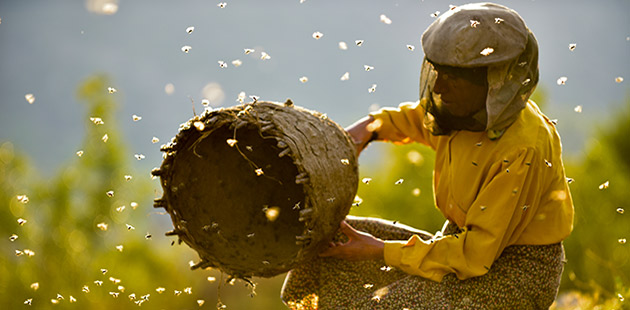 Aside from the occasional visit to the neighbouring city, Macedonian beekeeper Hatidže Muratova lives a life free from the forces of capitalism. Muratova’s day-to-day experiences, expressing a level of self-sufficiency and traditionalism almost unheard of in Western culture, are captured with an alluring glow in the mesmerising, albeit foreboding, environmental documentary Honeyland.
Aside from the occasional visit to the neighbouring city, Macedonian beekeeper Hatidže Muratova lives a life free from the forces of capitalism. Muratova’s day-to-day experiences, expressing a level of self-sufficiency and traditionalism almost unheard of in Western culture, are captured with an alluring glow in the mesmerising, albeit foreboding, environmental documentary Honeyland.
The arrival of a new family in a remote area of the Republic of North Macedonia, one abound in mountain views and brimming sunlight, sets-off a chain of events that threatens the livelihood of Muratova and her bedridden mother. Motivated by the promise of income, the family’s efforts – embodying the dangerous way resources are exploited by big business – negatively impact the village’s ecosystem.
Often shown conducting her beekeeping duties without safety equipment, Muratova expresses a sense of technique and decorum lost upon her foolhardy neighbours; their negligence seeing them become magnets for bee stings. Muratova’s conscientious practices, taking only what is needed and leaving no bee behind, portrays her as a Mother-Nature-esque being.
The manner whereby directors Tamara Kotevska and Ljubomir Stefanov contrast the behaviours of Muratova with her wayward neighbours is nothing short of sublime, with the grand effect of this juxtaposition offering a hard-hitting, emotionally-laced critique of greed and over-consumption.
Despite Honeyland’s unprecedented recognition at the Academy Awards, being the first film ever nominated for both Best Feature Documentary and Best International Feature Film, its absence from the cinematography category is befuddling.
Empowering the stunning scenery to communicate the importance of conservation, Honeyland could well and truly be the most beautifully shot documentary film in-existence – a feat all the more impressive considering the visual nature of documentary filmmaking.
The respect owed to nature by society is one evocatively acknowledged in Honeyland. The film looks at conservation as an investment into the future and observes this through the eyes of an extraordinary individual whose deep connection with nature finds her unaffected by pressures to consume.
As striking visually as it is thematically, Honeyland offers a compelling assessment on environmentalism that demands for further action to be made in the fight against climate change.
Honeyland screens in selected cinemas across Australia. For more information, visit: www.palacecinemas.com.au for details.
Image: Honeyland (film still)
Review: Hagan Osborne
